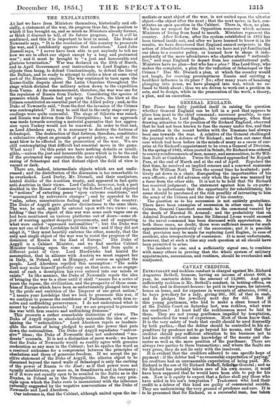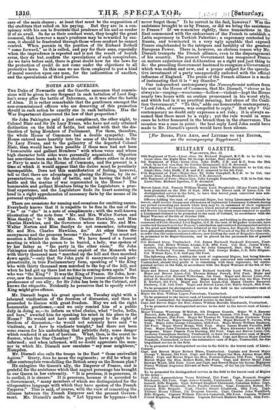CAVEAT CREDITOR.
EXTRAVAGANT and reckless conduct is charged against Mr. Richard Augustus Bethell, because, having an income of about 6001 a year, he contracts debts to the amount of 12,0004 And quite sufficiently reckless is Mr. Bethell's conduct, in betting-offices, on the turf, and in discount-houses : he paid in two years, for interest, bonus on loans, and for expenses in warrants of attornies, 10001.; he buys jewellery for a lady, giving 90/., 30/. of that in cash, and he pledges the jewellery next day for 551. But if this young gentleman, who had to make a clean breast of it at the Dublin Court on Saturday last, was reckless, what were his creditors ? At least half the recklessness must be Iaid to them. They are not young gentlemen impelled by temptation, and unchecked for want of experience. Most of them know that. It is the very safety of trade that credit should be used discreetly by both parties,—that the debtor should be controlled in his ex- penditure by prudence not to go beyond his means, and that the creditor should pay sufficient attention to his business not to lend his credit without some knowledge of the means and cha- racter as well as the mere position of the purchaser. There are always two parties to these transactions; and where the faults are very gross, they do not lie only with the insolvent. It is evident that the creditors adhered to one specific hope of payment : if the debtor had " no reasonable expectation of paying," his creditors had an unreasonable expectation, of being paid. Mr. Richard is the son of Sir Richard Bethel', Solicitor-General ; and as Sir Richard has probably taken care of his own means, it must have been supposed that he would have been able to pay for his son. Now is it equity to expect that a father shall pay those who have aided in his son's temptation ? Tradesmen who lend their credit to a debtor of this kind are guilty of commercial suicide. They are undermining the very ground of prudence and care. It is to be presumed that Sir Richard, as a successful man, has taken
care of the main chance; at least that must be the supposition of the creditors that relied on his paying. But they are in a con- spiracy with his son to frustrate that prudence of his and so render it of no avail. So far as their conduct went, they taught the great immoral, that however a man's prudence may be rewarded by suc- cess, it should be frustrated through those whose conduct he cannot controL When parents in the position of Sir Richard Bethell " come forward," as it is called, and pay for their sons, especially when the imprudence is repeated and is not the result of boyish error, they do but, confirm the speculations of such conspirators. As we have before said, there is great doubt how far the laws for the protection of credit do not come under the objections to all protective laws. In this case •we see them employed to put a kind of moral coercion upon one man, for the indiscretion of another, and the speculations of third parties.





































 Previous page
Previous page